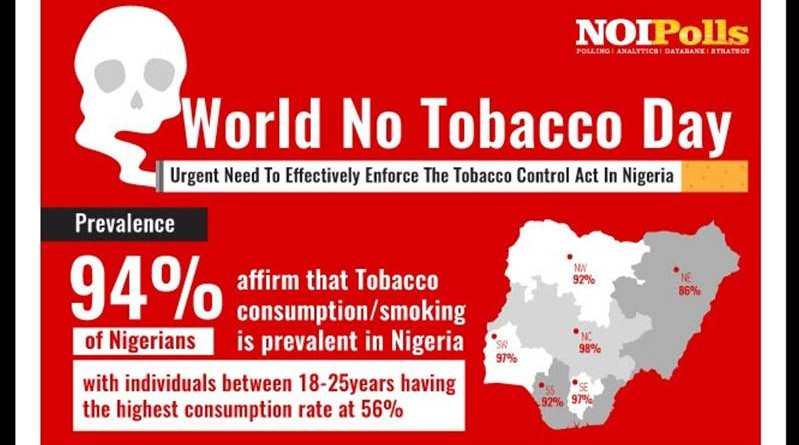World No Tobacco Day Poll: Urgent Need to Enforce Laws Reducing Tobacco Consumption in Nigeria – NOIPolls
NOIPolls joins the world in commemoration World No Tobacco Day (WNTD) which is observed annually on the 31st of May. The annual campaign seeks to inform and sensitize people on the deadly and destructive effects of tobacco use and second-hand smoke exposure as well as to discourage the use of tobacco in any form. The theme for the 2019 World No Tobacco Day is “Tobacco and lung health”.[1] The aim of this year’s theme is to increase awareness amongst other things; on the effect of tobacco consumption on people’s health which range from cancer to chronic respiratory disease, the pivotal role lungs play in the overall health and well-being of people and the inter-relationship between tobacco smoking and tuberculosis death.1 For instance, according to the World Health Organization (WHO), tobacco epidemic is one of the biggest public health threats the world has ever faced as it kills more than 7 million people annually. Sadly, more than 6 million of those deaths are the result of direct tobacco use while around 890 000 are the result of non-smokers being exposed to second-hand smoke.[2]
Nigeria is not exempted from this public health threat as it is estimated that more than 16,100 Nigerians die annually from tobacco-related diseases, while over 25,000 children (10 – 14 years) and more than 7.4 million adults continue to use tobacco each day.[3] In commemoration of the World No Tobacco Day (WNTD), NOIPolls presents findings from its past poll on tobacco consumption. The poll which was conducted in October 2016 highlighted perception of Nigerians concerning the prevalence of tobacco consumption, its harmful effects as well as the level of support for the implementation of Government’s policies on tobacco consumption. The poll results revealed that there is high prevalence (94 percent) of tobacco consumption in Nigeria however, 22 percent disclosed that they consume tobacco.
The poll results further showed that tobacco consumption is highly prevalent among the youth aged 18-25 years (56 percent). Interestingly, those aged between 18-35 years (58 percent) accounted for the largest proportion of Nigerians who made this assertion. Also, perception on the effects of smoking tobacco products revealed that most Nigerians (91 percent) acknowledged that it is very harmful and affirmation this cut across gender, geo-political zones and age-groups. Lastly, poll results showed that majority of the respondents were in support of laws aimed at reducing the consumption of tobacco in the country. Remarkably, 79 percent advocated that the health warning labels on the packs of cigarettes should be strengthened, 87 percent indicated that smoking in public places should be banned, 76 percent want tougher restrictions on the sale of tobacco products, while banning of all forms of advertisement for tobacco products was supported by 71 percent of the respondents.
The chart below revealed that most Nigerians (71 percent) admitted that there is a high prevalence of tobacco smoking in the country. Also, 23 percent of the respondents stated that it is somewhat prevalent whereas 6 percent reported that tobacco smoking is not prevalent at all.
Consequently, perception on smoking habits revealed that a larger proportion of the respondents (69 percent) claimed that they have never smoked tobacco. While 14 percent of the respondents indicated that they smoke tobacco regularly, 8 percent reported that they sometimes smoke tobacco but not regularly.
An evaluation of tobacco smoking amongst various age-groups revealed that tobacco consumption is highly prevalent among the youth aged 18-25 years (56 percent) and most of the respondents in this category are those aged between 18-35 years (58 percent). The prevalence of tobacco smoking among youths may be influenced by peer pressure, boosting their ego, getting tipsy, earning perceived recognition or respect, overcoming shyness and depression among other reasons.

The opinion of Nigerians about the effects of smoking cigarettes was revealed that most Nigerians (91 percent) considered it to be very harmful. This assertion could suggest that Nigerians are aware of the implications of tobacco consumption.
Lastly, poll results indicated that most of the respondents were in support of laws aimed at reducing the consumption of tobacco in the country. 79 percent advocated that the health warning labels on the packs of cigarettes should be strengthened, 87 percent indicated that smoking in public places should be banned, 76 percent want tougher restrictions on the sale of tobacco products, while banning of all forms of advertisement for tobacco products was supported by 71 percent of the respondents.
In conclusion, the poll results revealed that there is high prevalence of tobacco consumption mostly among youths aged between 18-25 years. Interestingly, 91 percent of the respondent admited that tobacco consumption is very hamful to a person therefore, there is need for concerted effort in the area of sensitization to educate especially the youths on the dangers and devastating effects of tobacco smoking on human health. Finally, there is need for the effective implementation of the Tobacco Control Act which has already being passed by the 7th Assembly and signed into law in 2015. The implementation and enforcement of the law will no doubt, bring about the much desired control of tobacco smoking and thereby curb the attendant effects of diseases related deaths caused by tobacco consumption.
Disclaimer
This press release has been produced by NOIPolls Limited to provide information on all issues which form the subject matter of the document. Kindly note that while we are willing to share results from our polls with the general public, we only request that NOIPolls be acknowledged as author whenever and wherever our poll results are used, cited or published.
NOIPolls hereby certifies that all the views expressed in this document accurately reflect the views of respondents surveyed for the poll, and background information is based on information from various sources that it believes are reliable; however, no representation is made that it is accurate or complete. Whilst reasonable care has been taken in preparing this document, no responsibility or liability is accepted for errors or fact or for any views expressed herein by NOIPolls for actions taken as a result of information provided in this report. Any ratings, forecasts, estimates, opinions or views herein constitute a judgment as at the date of this document. If the date of this document is not current, the views and content may not reflect NOIPolls’ current findings and/or thinking.








